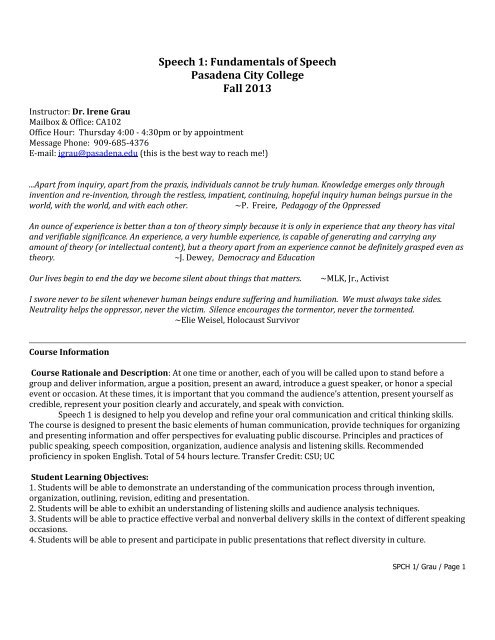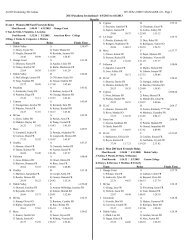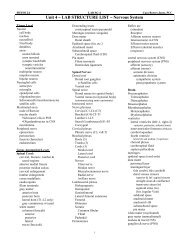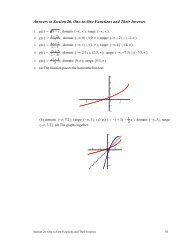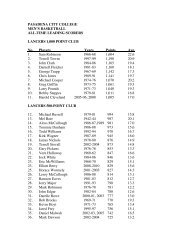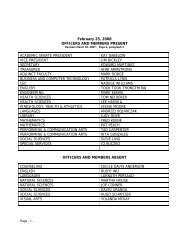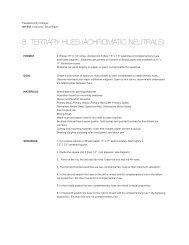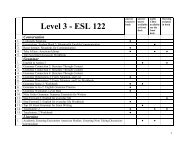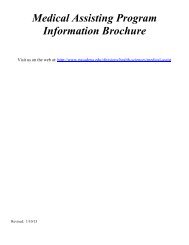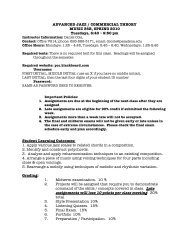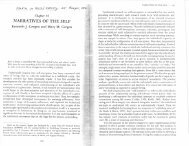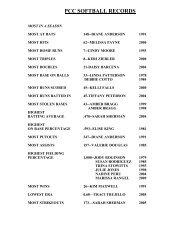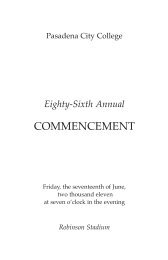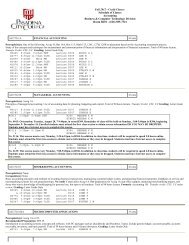Speech 001 Syllabus - Pasadena City College
Speech 001 Syllabus - Pasadena City College
Speech 001 Syllabus - Pasadena City College
Create successful ePaper yourself
Turn your PDF publications into a flip-book with our unique Google optimized e-Paper software.
<strong>Speech</strong> 1: Fundamentals of <strong>Speech</strong><br />
<strong>Pasadena</strong> <strong>City</strong> <strong>College</strong><br />
Fall 2013<br />
Instructor: Dr. Irene Grau<br />
Mailbox & Office: CA102<br />
Office Hour: Thursday 4:00 - 4:30pm or by appointment<br />
Message Phone: 909-685-4376<br />
E-mail: igrau@pasadena.edu (this is the best way to reach me!)<br />
...Apart from inquiry, apart from the praxis, individuals cannot be truly human. Knowledge emerges only through<br />
invention and re-invention, through the restless, impatient, continuing, hopeful inquiry human beings pursue in the<br />
world, with the world, and with each other.<br />
~P. Freire, Pedagogy of the Oppressed<br />
An ounce of experience is better than a ton of theory simply because it is only in experience that any theory has vital<br />
and verifiable significance. An experience, a very humble experience, is capable of generating and carrying any<br />
amount of theory (or intellectual content), but a theory apart from an experience cannot be definitely grasped even as<br />
theory.<br />
~J. Dewey, Democracy and Education<br />
Our lives begin to end the day we become silent about things that matters.<br />
~MLK, Jr., Activist<br />
I swore never to be silent whenever human beings endure suffering and humiliation. We must always take sides.<br />
Neutrality helps the oppressor, never the victim. Silence encourages the tormentor, never the tormented.<br />
~Elie Weisel, Holocaust Survivor<br />
Course Information<br />
Course Rationale and Description: At one time or another, each of you will be called upon to stand before a<br />
group and deliver information, argue a position, present an award, introduce a guest speaker, or honor a special<br />
event or occasion. At these times, it is important that you command the audience’s attention, present yourself as<br />
credible, represent your position clearly and accurately, and speak with conviction.<br />
<strong>Speech</strong> 1 is designed to help you develop and refine your oral communication and critical thinking skills.<br />
The course is designed to present the basic elements of human communication, provide techniques for organizing<br />
and presenting information and offer perspectives for evaluating public discourse. Principles and practices of<br />
public speaking, speech composition, organization, audience analysis and listening skills. Recommended<br />
proficiency in spoken English. Total of 54 hours lecture. Transfer Credit: CSU; UC<br />
Student Learning Objectives:<br />
1. Students will be able to demonstrate an understanding of the communication process through invention,<br />
organization, outlining, revision, editing and presentation.<br />
2. Students will be able to exhibit an understanding of listening skills and audience analysis techniques.<br />
3. Students will be able to practice effective verbal and nonverbal delivery skills in the context of different speaking<br />
occasions.<br />
4. Students will be able to present and participate in public presentations that reflect diversity in culture.<br />
SPCH 1/ Grau / Page 1
Student Performance Objectives:<br />
Upon successful completion of this course, the student will be able to...<br />
1. Recognize and explain the place of rational speech in a democracy.<br />
2. Evaluate trends in modern speech-making.<br />
3. Demonstrate basic patterns used in public speaking - composition, organization, and audience analysis.<br />
4. Prepare and deliver an informative speech.<br />
5. Prepare and deliver a persuasive speech.<br />
6. Criticize public speeches by developing proper listening skills.<br />
Essentially, the primary focus of this course is developing well-reasoned arguments with good evidence and effectively<br />
communicating those arguments. In other words, a great performance is meaningless if there’s no substance to the<br />
content.<br />
Required Materials:<br />
Email: Students enrolled in <strong>Pasadena</strong> <strong>City</strong> <strong>College</strong> must use an <strong>Pasadena</strong> <strong>City</strong> <strong>College</strong> email address. I will only<br />
contact you at your PCC email account so you need to check your student email at least three times a week.<br />
Access to Canvas: Registering with Canvas is mandatory (https://pcc.instructure.com/login). Lecture<br />
supplements, course materials, and assignment overviews are available through an on-line learning system All<br />
assignment descriptions are on Canvas, and it your responsibility to download all appropriate documents. You<br />
must download RUBRIC files from Canvas and bring it to class on speech days. Failure to do so will result in a<br />
zero for your speech grade. NO EXCEPTIONS!<br />
Scantrons: 2 Green 882-E scantrons for exams and #2 pencils<br />
Note Cards: 4" x 6" note cards<br />
Dr. Grau’s Facebook <strong>Speech</strong> Page: “Liking” this page will allow you to receive announcements, reminders, and<br />
links to current events on your Facebook News page that may be useful to your success in this class.<br />
http://www.facebook.com/DrGraus<strong>Speech</strong>Page<br />
Coursework: Your grade will be determined from your performance in oral and written assignments, and<br />
participation in activities in and out of class. Formal assignments are worth the following:<br />
Introduction <strong>Speech</strong>: a 1 to 3 minute introductory presentation ........................ 30pts<br />
In this speech, you will introduce your partner to the class. You may tell us about her interests or hobbies, his<br />
family, her job, an important event in her life, or any other number of things that you feel it is important that<br />
we know about him. This speech will focus on developing an effective attention-getter and preview statement for<br />
the body of the speech, as well as an effective conclusion.<br />
Cultural Artifact: a 3 to 5 minute presentation ............................................ …………..50pts<br />
This is a self-introductory speech that asks you to bring an object to class that represents an aspect of your<br />
culture. This speech will expand the focus to include a carefully crafted thesis statement, a significance statement,<br />
clear transitions, and a carefully crafted concluding thought. 35 points for the speech; 15 points for the outline.<br />
SPCH 1/ Grau / Page 2
Informative <strong>Speech</strong>: a 4 to 6 minute presentation...............................75 pts<br />
This speech will include everything you have learned so far, as well as will focus on including research and oral<br />
citations. You must use a minimum of three (3) credible sources. Your outline will also include in-text citations<br />
and a Works Cited section using MLA OR APA style format. 60 points for the speech; 15 points for the outline.<br />
Persuasive <strong>Speech</strong>: a 6 to 8 minute presentation..................................100 pts<br />
This speech will expand the focus to include a credibility statement and a minimum of 4 sources. In this<br />
presentation, you will structure a speech to convince us to adopt a particular position you hold on a given topic.<br />
Your job as a speaker is to provide credible evidence to support your argument. 75 points for the speech; 25<br />
points for the outline.<br />
Advocacy <strong>Speech</strong>: a 20 - 25 minute group presentation .......... ..............…………..125pts<br />
This speech takes persuasion to the next step where you ask your audience to act. Thus, you will become an<br />
advocate for that action. This speech brings together all of the aspects of effective public speaking, thus<br />
requires more careful planning and practice. This speech requires a minimum of three (5) credible sources<br />
to support your argument and the use of Monroe's Motivated Sequence. 100 points for the speech, divided<br />
between group and individual components; 25 points for the group outline.<br />
Speaker Evaluation Paper: an evaluation of a formal presentation... ............... 50pts<br />
You will choose a speech to watch and evaluate both the speaker's presentation and the content of the<br />
speech, incorporating the concepts of effective public speaking discussed this semester. See Canvas for a list<br />
of speeches you may choose from. Or, with the permission of your instructor, you may choose to evaluate a<br />
live speaker on campus or in the community. You may use the same speech you used for your Listening<br />
Worksheet.<br />
Midterm Exam: multiple choice scantron exam............................................50pts<br />
Final Exam: Cumulative multiple choice scantron ......................................... 50pts<br />
Participation: Student Contract, In-class exercises, worksheets, etc….……......50pts<br />
Attendance: …………………………………………………………………………….…………….20pts<br />
You are allowed two absences, whether excused or unexcused. You will lose 2 points for each unexcused<br />
absence thereafter.<br />
NOTE: The following topics are not allowed as speech topics for a variety of reasons. Be creative in your search<br />
for topics and look for unusual or unique topics. Topics to avoid: Abortion; Gun control; Capital Punishment<br />
Policies, Procedures & Expectations:<br />
Social Contract: This class should foster an environment in which we can learn from each other. Everyone<br />
experiences communication outside class, but we must attempt to refine these rhetorical skills in the classroom<br />
through active involvement. Please be aware that you are likely to be confronted with issues about which you<br />
hold strong, even passionate beliefs or opinions. To maintain a learning atmosphere, however, our<br />
participation must be responsible and respectful to the whole class. To ignite our learning experience, we<br />
should be willing to openly disagree with and question each other. Learning does not happen without the open<br />
challenge and confrontation of assumptions. However, in a democratic environment, exclusion must be<br />
SPCH 1/ Grau / Page 3
avoided. As a result, actions that insult, demean, or attack (and therefore exclude) another classmate will<br />
never be appropriate--whether you 'like' what someone says or not. If you ever feel that someone has belittled<br />
you (even if it’s me), please speak to, write, or email me so that we can work out a better learning environment<br />
for all of us.<br />
Course Help: I am always willing and eager to help you, electronically or in person, within <strong>Pasadena</strong> <strong>City</strong> <strong>College</strong><br />
guidelines, to ensure your success in this course. If at any time during the course of the semester you are<br />
feeling overwhelmed or unsure of course materials, feel you are falling behind, or believe you need some help<br />
grasping assignment instructions or course concepts, please do not hesitate to see me. I can only be of<br />
assistance if I know you need some. I am also happy to chat with you about your progress.<br />
Special Needs: If you have any special needs or issues pertaining to your access to and participation in this or any<br />
other class at <strong>Pasadena</strong> <strong>City</strong> <strong>College</strong>, please feel free to contact me to discuss your concerns. Your disability<br />
must be documented by Disabled Students Programs & Services. You may call their office at 626-585-7127 or<br />
visit their office in D209 to request assistance and accommodations.<br />
Academic Honesty: Plagiarism and Cheating will not be tolerated. Plagiarizing means to use someone else’s<br />
words and/or ideas as though they were your own. Therefore, it is your responsibility to document all sources<br />
used in your academic work, whether it be verbatim, paraphrased, or summarized. The institutional<br />
consequences of plagiarism can be personally severe, but always betrays the academic community. A student<br />
who engages in scholastic dishonesty that includes, but is not limited to cheating, plagiarism, and<br />
collusion will receive an “F” on the assignment and may receive an "F" in the course. . By enrolling in<br />
this class, you agree to comply with the Student Conduct and Academic Honesty Policy (No. 4520 -<br />
www.pasadena.edu/IPRO/Policies/pcc_4520.pdf). Violations of conduct in class or on campus are subject to<br />
disciplinary review.<br />
Attendance: Each and every class meeting is important, and therefore attendance is mandatory. Your physical (as<br />
well as mental) presence is absolutely necessary. As this is primarily a participation/ performance class,<br />
absences will impact both your Attendance grade and most likely your final course grade. Excused absences<br />
are those that are for religious holidays or college-related travel and have been pre-approved by your<br />
instructor. Documented emergencies will be assessed on a case by case basis. If you are absent, it is your<br />
responsibility to ensure that you get class notes from your classmates and come to office hours to receive any<br />
handouts you may have missed.<br />
**Note: Attendance on performance days is mandatory. An unexcused absence on a day when your<br />
classmates are presenting will result in a 5% reduction of your final course grade.**<br />
Important Information:<br />
1. All written assignments must be typed, double-spaced with 1-inch margins and numbered pages, carefully<br />
edited for spelling and grammar; it should include your name, the course number, professor’s name and date in<br />
the top left hand corner; and all pages must stapled together.<br />
2. All assignments must be completed and turned in by the beginning of class on the assigned due date or, in the<br />
case of outlines, when your speech is due. Assignments turned in after the first five minutes of class are<br />
considered late and may incur a grade reduction.<br />
3. Written assignments (Evaluation paper and speech outlines) will incur a 10% grade reduction per day<br />
(including non-class days and weekends) after the due date. Excuses like “my computer ate my disk” or “my<br />
SPCH 1/ Grau / Page 4
printer is broken” are not acceptable. Save often, print and back up; keep multiple copies of your work in case<br />
problems arise; identify an alternate computer should you have difficulties with your primary computer. Keep<br />
your graded and returned work in a safe place until the semester is over – this will forestall any grading<br />
discrepancies that may arise.<br />
4. Generally, there will be no make-ups for missed speech performances. Should you get an opportunity to make<br />
up a speech, the final grade may be reduced by up to 20% of total possible points but in any case will receive a<br />
grade no higher than a C.<br />
5. Attendance on speech days is mandatory – scheduled speech days are on the calendar. If you know you will be<br />
out of class for a college-approved reason, you will need to notify me before the speech day and provide<br />
documentation for that absence. Unexcused absences on speech days will result in a 5% reduction of your final<br />
course grade.<br />
6. There will be no make-ups for any impromptu class work such as impromptu speeches, pop quizzes or other<br />
assignments.<br />
7. TURN OFF PAGERS AND CELL PHONES BEFORE ENTERING THE CLASS--Any electronics that go off during a classmate’s<br />
speech will result in a 5% deduction in your speech grade. Any electronics that go off during an exam results<br />
in the immediate conclusion of that exam.<br />
Grading:<br />
Grades will be issued on a standard A - F scale. My grading scale corresponds to the following percentages: A =<br />
90% and above B = 80 to 89.9% C = 70 to 79.9% D = 60 to 69.9% F = less than 60%<br />
A= 540 - 600 B= 480 - 539 C= 420 - 479 D= 360 - 419 F=
An above average (B) speech is a good speech. It has significant content, good organization, and proficient<br />
delivery. It should meet all of the criteria for the average speech (above) and also match the following description:<br />
1. It fulfills all major functions of a speech introduction and conclusion.<br />
2. It displays clear organization of main points and support materials.<br />
3. Its main points are supported with evidence that meets the tests of accuracy, relevance, objectivity, and<br />
sufficiency.<br />
4. It exhibits proficient use of connectives.<br />
5. It is delivered skillfully enough so as not to distract attention from the speaker's message.<br />
6. It demonstrates skill in winning understanding of challenging concepts, events, objects or processes; or<br />
in either winning agreement from auditors initially inclined toward apathy or disagreement or in<br />
winning action from auditors.<br />
A superior (A) speech stands out from the crowd. It has superior content, excellent organization and distinctive<br />
delivery. In short, it represents the speaker's best creative effort. An A speech gets nearly everyone in the audience<br />
thinking, excited, concerned, desirous to hear more, read more, or do something about what was said. It should<br />
meet all the criteria for the average and above average speeches and also match the following description:<br />
1. It constitutes a genuinely individual contribution by the speaker to the knowledge or beliefs of the<br />
audience.<br />
2. It meets the assignment exactly.<br />
3. It contains elements of vividness and special interest in the use of language.<br />
4. It is delivered in a fluent, polished manner that strengthens the impact of the speaker's message.<br />
5. It illustrates mastery of the use of connectives.<br />
6. It exhibits creative thinking about and logical analysis of the topic.<br />
For the record, it is also possible to earn less than a C on speech assignment.<br />
A below average (D) speech is deficient in significant ways. It is characterized by one or more of the following:<br />
1. It fails to clearly conform to any of the patterns of organization.<br />
2. It is delivered in a way that ignores the audience (e.g., it is read to the audience).<br />
3. It is delivered late with prior approval of your instructor.<br />
4. It fails to conform to the time limit.<br />
5. It fails to use or cite support materials as required by the assignment.<br />
A failing (F) speech is seriously deficient and is characterized by one or more of the following:<br />
1. It is not delivered on the day assigned and the speaker has not contacted his/her instructor prior to class.<br />
2. It has serious ethical flaws such as plagiarizing another person's speech, using sources without proper<br />
citation, or manufacturing support material and citations.<br />
3. It does not correspond to the definition of the assignment (e.g., it is persuasive when the assignment calls<br />
for an informative speech).<br />
4. It does not come close to conforming to the time limit.<br />
5. It insults, humiliates, or demeans the audience or members of the community at large or is in other ways<br />
inappropriate for a presentation in a college classroom.<br />
SPCH 1/ Grau / Page 6
Note: If you wish to discuss a grade, I am always willing to meet with you to discuss the reasons for my evaluation<br />
and about how to improve for future assignments, but I will do so no sooner than 24 hours after graded<br />
assignments have been returned. If you wish to contest a grade, turn in to me within 7 days the graded<br />
assignment, the assignment sheet, and a typed statement explaining which specific areas of the assignment you<br />
feel were inappropriately evaluated and why. We will arrange to meet after I have had time to consider your<br />
arguments. Keep in mind: although the amount of time and effort given to an assignment as well as the skills and<br />
abilities displayed in class are significant to the overall course grade, the actual performance of the finished<br />
product as written or delivered is what determines the grade for each specific assignment. Any request for a grade<br />
change is welcomed, but understand that a grade challenge does not guarantee a change in grade.<br />
Final Thoughts:<br />
You will learn something if you give the class a good-faith effort throughout the semester. That includes:<br />
working well with others – many assignments require that you rely on and are responsible to your<br />
classmates;<br />
asking questions if anything is unclear -- often, a poor grade can be averted by a 5-minute conversation;<br />
trying to find topics that actually interest you within the required guidelines so that your work will be more<br />
interesting, and probably of better quality; and most importantly,<br />
having fun!!! <br />
Fall 2013 SPCH 1: Public Speaking<br />
Tentative Schedule*<br />
Week Topic Homework<br />
Course Introduction<br />
Assign Student Contract;<br />
Develop Classroom Norms;<br />
Wk 1: <strong>Syllabus</strong><br />
Discuss Introduction <strong>Speech</strong>;<br />
8/30 Speaking in Public<br />
Take PRCA 24 Online at<br />
http://www.marsaglia.com/greatspeakers/<br />
Print out results and bring to class next week<br />
DUE: Introduction <strong>Speech</strong><br />
DUE: Student Contract<br />
Wk 2: Presentations<br />
DUE: PRCA 24 Results<br />
9/6 Ethics & Listening<br />
Analyzing a speech: Assign <strong>Speech</strong> Analysis Paper<br />
Assign Listening Worksheet<br />
Wk 3:<br />
9/13<br />
Wk 4:<br />
9/20<br />
Speaking to Inform; Outlines;<br />
Introductions & Conclusions;<br />
Visual Aids<br />
Presentations<br />
Topics & Purpose; Thesis<br />
Statements; Organization<br />
DUE: Listening Worksheet<br />
Assign “Cultural Artifact” <strong>Speech</strong><br />
Writing Intro/Conclusion<br />
Constructing an Outline<br />
Due: Cultural Artifact <strong>Speech</strong> w/outline<br />
Assign Informative <strong>Speech</strong><br />
Defining Purpose and Choosing Topics<br />
Constructing Thesis Statement<br />
Developing & Supporting Main Points<br />
SPCH 1/ Grau / Page 7
Wk 5:<br />
9/27<br />
Wk 6:<br />
10/4<br />
Wk 7:<br />
10/11<br />
Wk 8:<br />
10/18<br />
Wk 9:<br />
10/25<br />
Wk 10:<br />
11/1<br />
Wk 11:<br />
11/8<br />
Wk 12:<br />
11/15<br />
Wk 13:<br />
11/22<br />
Wk 14:<br />
11/29<br />
Wk 15:<br />
12/6<br />
Wk 16:<br />
12/13<br />
Library Tour & Research<br />
Presentations<br />
Speaking to Persuade;<br />
Analyzing the Audience<br />
Gathering Materials; Supporting<br />
Your Ideas<br />
Language; Semantic Triangle; &<br />
Delivery<br />
Midterm Exam<br />
Reasoning & Fallacies<br />
Analyzing Evidence<br />
Presentations<br />
Presentations<br />
Monroe’s Motivated Sequence<br />
Workshop<br />
Presentations<br />
No Class - Thanksgiving<br />
Presentations<br />
Final Exam<br />
Due: Informative Topic & Thesis Statement<br />
Worksheet<br />
DUE: Informative <strong>Speech</strong> w/Outline<br />
Assign Persuasive <strong>Speech</strong><br />
Review Purpose & Choosing Topics<br />
Creating Surveys/Questionnaires<br />
Assign Audience Analysis Instrument<br />
DUE: Persuasive <strong>Speech</strong> Topic and Thesis Worksheet<br />
DUE: Audience Analysis Instrument<br />
Assign Library Research Worksheet<br />
DUE: Library Research Worksheet<br />
Bring Green Scantron #882-E & Pencils<br />
“Subway from Hell” Video Analysis<br />
DUE: Persuasive <strong>Speech</strong> w/Outline<br />
DUE: Persuasive <strong>Speech</strong> w/Outline<br />
Assign Advocacy <strong>Speech</strong>; Create Groups<br />
Reminder: <strong>Speech</strong> Analysis Paper<br />
Workshop Advocacy <strong>Speech</strong>: Bring two copies of full<br />
sentence/preparation outline to class<br />
DUE: <strong>Speech</strong> Analysis Paper<br />
DUE: Advocacy <strong>Speech</strong> w/Outline<br />
DUE: Advocacy <strong>Speech</strong> w/Outline<br />
8:30 - 10:30am<br />
* I will do my best to stay on this schedule. However, I reserve the right to adjust this schedule as needed. You will<br />
be notified of any changes made to the schedule.<br />
SPCH 1/ Grau / Page 8


